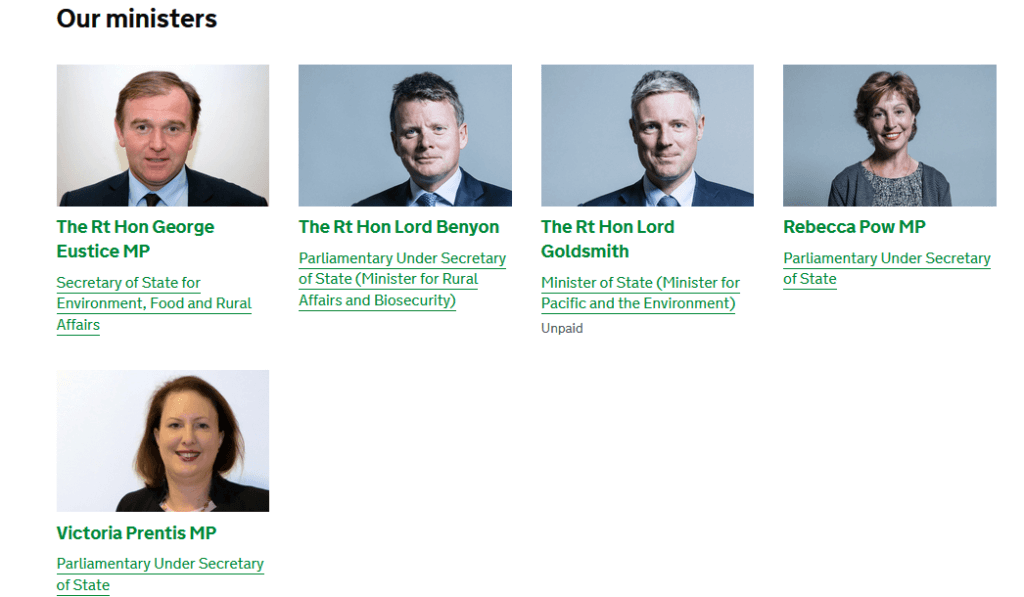
Richard Benyon, the toffish ex-MP returns to DEFRA as a Lords Minister. DEFRA now has two lords a-leaping and with Zac G being unpaid, it rather looks like a strange BOGOF deal. As a minister in the upper house Lord Benyon will have to answer difficult questions from the likes of Baroness Bennett and others on his comeback tour. His title, PUS for Rural Affairs and Biosecurity, suggests that he may be answering difficult questions on the new ELMS scheme and our future world-leading agrculture policy, of which he will have personal experience as a landowner (although there is not much farming going on in the chunks of London that he owns).
Yes Richard B is a grouse moor owner but let it be said that his family moor in the Findhorn valley has a good reputation, especially for nesting eagles. And yes he is a keen Pheasant shooter and a former trustee of the GWCT but then, he is also now, presumably, an ex-trustee of Plantlife and of the new River Action. Lord Benyon has also been busy putting together a review of marine protected areas since his last ministerial gig – see here. So, of all the peers in all the world the environment might be better off with this one as the matching order in the BOGOF deal than many others.
Reading Richard B’s words in Plantlife’s magazine one wonders whether he had any inkling of his new role, but probably not because he sounds almost like a campaigner in it; it is titled ‘It’s a revolution’ and has headings ‘There is more to do’ and ‘We can make it happen’. In the article Lord Benyon imagines a green bond which, coupled with biodiversity offsetting and natural capital ‘credits’ would attract corporate investors to the uplands and return vast areas to wildflower-rich meadows. As he says ‘We can dream of such circumstances or we can be part of making it happen’ – Lord Benyon will now be a small part of making it happen but will also have to respond to questions if it doesn’t.
[registration_form]
Of all the Tories available in the HOL, Benyon may be better qualified for the role than most. It may also be true that as a large (well, very large) land-owner he has shown himself to be more environmentally responsible than many and that he has a genuine commitment to helping wildlife flourish. Nevertheless, it is also an unavoidable fact that he has a clear conflict of interest on issues that relate to his brief including questions touching on environmental controls on agricultural practices, legal issues around hunting and shooting, and issues relating to access to the countryside.
Perhaps we should be pragmatic and judge Benyon on what he actually does in the role rather than on who he is and what he may represent but it remains a bizarre feature of our system of government that an unelected grandee can be appointed to a powerful role that is so intimately associated with his personal interests.
Hopefully as he leaves Plantlife’s Board he can forget about the dangerous nonsense of green bonds invested in biodiversity offsets or natural capital credits.
If he’s taken on Lord Gardiner’s role without any changes, he won’t be getting involved in the nuts and bolts of ELMS.
responsibilities are:
ministerial lead for COVID-19 relating to Defra issues
biosecurity strategy, including animal health and traceability
management of endemic and exotic animal diseases, including bovine TB policy
plant and tree health
invasive non-native species
food compositional standards and food labelling
food supply, security and resilience
rural affairs: rural productivity and connectivity, rural life opportunities (childcare, education, skills and health)
landscape, including National Parks and AONBs
access including rights of way and coastal paths
lead for APHA, VMD, RBG Kew and AHWBE, and relationship with the FSA
And at least he won’t be taking on Gardiner’s unofficial role as the Countryside Alliance’s man inside Defra.
Miles – well I’m not sure about the last point, he will be the GWCT’s, CLA’s, Moorland Association’s person inside DEFRA perhaps?
And, as you know, the way ministerial influence works (indeed any sort of influence in any large organisations (yes, including wildlife NGOs)) is that everyone is trying to work out what the people at the top really want and hang on any word or hint as to how they shoud approach life.
Civil servants would do that if you or I were ministers – and we wouldn’t have to say anything to adjust the outlook of the department a little bit. Just being there would be enough. And then the odd word here or there, or the odd question, or perhaps a frown, would have a bit more influence. This is normal, but it’s also why the identity of the leaders is important (as you know).
Grouse moor owner failed to put carbofuran and other illegal pesticides on an illegal to possess list not one of the good guys but it could be worse.